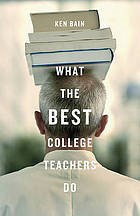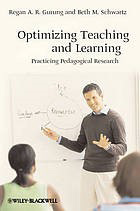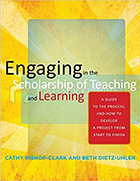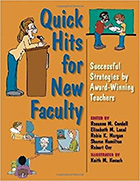Self-reflection, assessment and evaluation, sharing and mentoring are the general themes in these books. We hope they inspire you to consider instructional effectiveness and the opportunities for further development of what we know and how we go about the important work of teaching and learning.
Staff Picks
 Bain, K. (2004). What the best college teachers do. Cambridge, Mass: Harvard University Press.
Bain, K. (2004). What the best college teachers do. Cambridge, Mass: Harvard University Press.
 Gurung, R. A. R., & Schwartz, B. M. (2009). Optimizing teaching and learning: Practicing pedagogical research. Chichester, U.K: Wiley-Blackwell.
Gurung, R. A. R., & Schwartz, B. M. (2009). Optimizing teaching and learning: Practicing pedagogical research. Chichester, U.K: Wiley-Blackwell.
Less teaching, more learning: 10-yr study supports increasing student learning through less coverage and more inquiry; Luckie, D. B., Aubry, J. R., Marengo, B. J., Rivkin, A. M., Foos, L. A., & Maleszewski, J. J. (January 01, 2012). Advances in Physiology Education.
Undergraduate students' perspectives of essential instructor qualities; Trammell, B., & Aldrich, R. (February 26, 2016). Journal of the Scholarship of Teaching and Learning.
Support, belonging, motivation, and engagement in the college classroom: A mixed method study; Zumbrunn, S., McKim, C., Buhs, E., & Hawley, L. R. (September 01, 2014). Instructional Science: an International Journal of the Learning Sciences.
Books
 Bain, K. (2004). What the best college teachers do. Cambridge, Mass: Harvard University Press.
Bain, K. (2004). What the best college teachers do. Cambridge, Mass: Harvard University Press.
What makes a great teacher great? Who are the professors students remember long after graduation? This book, the conclusion of a fifteen-year study, offers valuable answers for all educators. The short answer is — it's not what teachers do, it's what they understand. Lesson plans and lecture notes matter less than the special way teachers comprehend the subject and value human learning. Whether historians or physicists, in El Paso or St. Paul, the best teachers know their subjects inside and out — but they also know how to engage and challenge students and to provoke impassioned responses. Most of all, they believe in two things: that teaching matters, and that students can learn. Ken Bain describes examples of ingenuity and compassion, of students' discoveries of new ideas and the depth of their own potential.
 Bishop-Clark, C., & Dietz-Uhler, B. (2012). Engaging in the scholarship of teaching and learning: A guide to the process, and how to develop a project from start to finish.
Bishop-Clark, C., & Dietz-Uhler, B. (2012). Engaging in the scholarship of teaching and learning: A guide to the process, and how to develop a project from start to finish.
This guide provides prospective SoTL scholars with the necessary background information, foundational theory, tools, resources, and methodology to develop their own SoTL projects, taking the reader through the five stages of the process: generating a research question; designing the study; collecting the data; analyzing the data; and presenting and publishing your SoTL project. Each stage is illustrated by examples of actual SoTL studies and is accompanied by worksheets to help the reader refine ideas and map out his or her next steps. The process and worksheets are the fruit of the successful SoTL workshops the authors have offered at their institution for many years.
 Cordell, R.M., Lucal, B., Morgan, R.K., Hamilton, S.J., & Orr, R. H. (2004). Quick hits for new faculty: Successful strategies by award winning teachers. Bloomington, IN: Indiana University Press.
Cordell, R.M., Lucal, B., Morgan, R.K., Hamilton, S.J., & Orr, R. H. (2004). Quick hits for new faculty: Successful strategies by award winning teachers. Bloomington, IN: Indiana University Press.
This is the third and latest book in the "Quick Hits" tradition of providing sound advice from award-winning college faculty. This volume is designed to help new faculty negotiate the challenges of college teaching. Articles and strategies range from planning for that first day in the classroom, to evaluating student learning, documenting teaching, and understanding the politics of teaching and learning in the department and institution. This volume expands each "quick hit" with additional background information, rationale, and resources.
 Gurung, R. A. R., & Schwartz, B. M. (2009). Optimizing teaching and learning: Practicing pedagogical research. Chichester, U.K: Wiley-Blackwell.
Gurung, R. A. R., & Schwartz, B. M. (2009). Optimizing teaching and learning: Practicing pedagogical research. Chichester, U.K: Wiley-Blackwell.
Optimizing Teaching and Learning will serve as a guide for anyone who is interested in improving their teaching and the learning of their students, and at the same time contribute to the scholarship of teaching and learning. It bridges the gap between the research and practice of SoTL, with explicit instructions on how to design, conduct, analyze, and write up pedagogical research, including samples of actual questionnaires and other materials (e.g., focus group questions) that will jumpstart investigations into teaching and learning. It also explores the advantages and disadvantages of various pedagogical practices and present applications of SoTL using case studies from a variety of disciplines. This book will serve as an invaluable resource for both seasoned faculty and new faculty who are just beginning to assess their teaching methods and learn how to think beyond the content.
Articles
Mere belonging: The power of social connections
Walton, G. M., Cohen, G. L., Cwir, D., & Spencer, S. J. (January 01, 2012). Mere belonging: The power of social connections. Journal of Personality and Social Psychology, 102, 3, 513-32.
"Four experiments examined the effect on achievement motivation of mere belonging, a minimal social connection to another person or group in a performance domain. Mere belonging was expected to increase motivation by creating socially shared goals around a performance task. … The results suggest that even minimal cues of social connectedness affect important aspects of self."
Multiple social identities and stereotype threat: Imbalance, accessibility, and working memory
Rydell, R. J., McConnell, A. R., & Beilock, S. L. (January 01, 2009). Multiple social identities and stereotype threat: Imbalance, accessibility, and working memory. Journal of Personality and Social Psychology, 96, 5, 949-66.
"In 4 experiments, the authors showed that concurrently making positive and negative self-relevant stereotypes available about performance in the same ability domain can eliminate stereotype threat effects. Replicating past work, the authors demonstrated that introducing negative stereotypes about women's math performance activated participants' female social identity and hurt their math performance (i.e., stereotype threat) by reducing working memory. Moving beyond past work, it was also demonstrated that concomitantly presenting a positive self-relevant stereotype (e.g., college students are good at math) increased the relative accessibility of females' college student identity and inhibited their gender identity, eliminating attendant working memory deficits and contingent math performance decrements."
Pedagogical perspectives for the online education skeptic
Brewer, P. E., & Brewer, E. C. (January 01, 2015). Pedagogical perspectives for the online education skeptic. Journal on Excellence in College Teaching, 26, 1, 29-52.
"While online programs continue to grow at an astounding rate in higher education, many faculty remain skeptical of the efficacy of online models. This article provides an overview of some significant benefits of online education while recognizing some common concerns. An examination of the current literature and the authors' own online experiences enable them to identify significant benefits in online education and suggest five foundational concepts for best practice."
Support, belonging, motivation, and engagement in the college classroom: A mixed method study
Zumbrunn, S., McKim, C., Buhs, E., & Hawley, L. R. (September 01, 2014). Support, belonging, motivation, and engagement in the college classroom: A mixed method study. Instructional Science: an International Journal of the Learning Sciences, 42, 5, 661-684.
"This explanatory sequential mixed methods study examined how belonging perceptions, academic motivation, and engagement might mediate the relationship between academic contextual characteristics and achievement using structural equation modeling and qualitative follow-up interviews with college students from a large, Midwestern university."
Yoo, J. H., Schallert, D. L., & Svinicki, M. D. (January 01, 2013). Effective teaching in an age of accountability: Mapping the views of college students and instructors. Journal on Excellence in College Teaching, 24, 4, 107-131.
"The authors captured students' and instructors' views of teaching effectiveness at the postsecondary level in two ways: open-ended questions delivered online to 500 students and one-on-one interviews with 15 instructors. A grounded theory approach suggested that effective teaching involves good communication aimed at helping students understand course concepts, strategies that engage students in learning, and a close monitoring of whether students are understanding, what they termed metacognitive teaching."
Hattie, J., & Timperley, H. (January 01, 2007). The power of feedback. Review of Educational Research, 77, 1, 81-112.
"Feedback is one of the most powerful influences on learning and achievement, but this impact can be either positive or negative. Its power is frequently mentioned in articles about learning and teaching, but surprisingly few recent studies have systematically investigated its meaning. This article provides a conceptual analysis of feedback and reviews the evidence related to its impact on learning and achievement. This evidence shows that although feedback is among the major influences, the type of feedback and the way it is given can be differentially effective."
The role of SoTL in the academy: Upon the 25th anniversary of Boyer's scholarship reconsidered
Kern, B., Mettetal, G., Dixson, M., & Morgan, R. (2015). The role of SoTL in the academy: Upon the 25th anniversary of Boyer's scholarship reconsidered. Journal of the Scholarship of Teaching and Learning, 15, 3, 1-14.
"This essay works toward two goals: 1) to provide an explanation of how the Scholarship of Teaching and Learning may work within all four of Boyer's 'scholarships' of discovery, integration, application, and teaching and 2) to clarify the distinctions between quality teaching and scholarship of teaching and learning research."
Linvill, D. (January 01, 2011). The relationship between student identity development and the perception of political bias in the college classroom. College Teaching, 59, 2, 49-55.
"This study explored the relationship between identity development, as gauged by Marcia's identity development construct, and student perception of instructor political bias. Regression analysis was employed to compare participant responses on the Ego Identity Process Questionnaire, a measure of Marcia's construct, with the Political Bias in the Classroom Survey, a measure gauging perceptions of and reactions to instructor political bias. The EIPQ's commitment scale was found to be a significant positive indicator for the PBCS's perception scale, suggesting that students who are strongly committed to their identity are more likely to perceive an instructor as having a political bias. Recommendations are made for how to address perceptions of political bias."
Luckie, D. B., Aubry, J. R., Marengo, B. J., Rivkin, A. M., Foos, L. A., & Maleszewski, J. J. (January 01, 2012). Less teaching, more learning: 10-yr study supports increasing student learning through less coverage and more inquiry. Advances in Physiology Education, 36, 4, 325-35.
"In this study, we compared gains in student content learning over a 10-yr period in which the introductory biology laboratory curriculum was changed in two ways: an increase of inquiry and a reduction of content."
Undergraduate students' perspectives of essential instructor qualities
Trammell, B., & Aldrich, R. (February 26, 2016). Undergraduate students' perspectives of essential instructor qualities. Journal of the Scholarship of Teaching and Learning, 16, 1, 15.
"There are many variables that impact a classroom experience including the instructor, the student, and the class itself. Much research has been done in the area of undergraduate student expectations and preferences for instructors, course format, etc. This paper explores how specific student characteristics such as first-generation status, age, class level, and format impact students' perception of what makes a good instructor."
